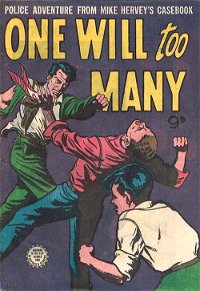Possible AusOriginal by James Zee
If it's Hervey, might be Aussie…
Despite Mick Stone's disclaimer of "likely omissions", it's rare to find a comic by Australian creators missing from his checklist of Australian comics.11"Australian Comics 1900-1960: A Checklist" in Annette Shiell, editor (1998), Bonzer: Australian comics 1900s–1990s, Elgua Media, Redhill South Victoria....
One possible addition to the index is One Will Too Many (Horwitz, 1955?) , a mystery one-shot comic without creator credits. The title story, which takes up the entire issue, is not reprinted from a typical US source.
One clue to its origins is the cover text, "Police adventure from Mike Hervey's casebook".
This does not refer to a character in the story (as might be implied by "Dick Tracy's casebook"), but to the prolific author of short 'who-dunnit' stories, Michael Hervey.
Michael Hervey (1915-1979)22Michael Hervey was born Mark Hockman and was also known as Mark Hoffman. He changed his name by deed poll... was an established English author who migrated to Australia, arriving in February 1952 and settling in Sydney.33It is often reported that Hervey settled in Australia in 1951, although the contemporary newspaper reports listed here clearly show... At the time, he had worked as an author for ten years producing "1,600 short stories, 62 novels, 23 plays, and about 230 non-fiction articles."44"This Migrant's Mind Dwells on Murder", The Argus (Melbourne, Vic: 1848-1957), 19 February 1952, p.7, viewed 7 March 2014,
His publishers routinely used the tag-line "If you're nervey, don't read Hervey", reflecting his inclination to crime, mystery and supernatural themes.
Depending on when this undated comic was published, the cover blurb could be a cross-promotion for the pulp Mike Hervey Detective Monthly Magazine, also published by Transport Publishing (Horwitz) in 1952 and 1953. That series is edited by Hervey and composed entirely of stories written by him, including new and reprint work.
Although it is tempting to conclude Hervey wrote "One Will too Many", it isn't certain. He has no other identified comic scripts. His other comics-related credit is text stories in the Australian boys' paper The Silver Jacket.77John Ryan (1979), Panel by Panel, Cassell Australia, Stanmore NSW, p.203....
While the story's artwork has the general mood of early Australian comics—Frank Johnson Publications and the Offset Printing Company come to mind—I can't identify a specific artist. Royce Bradford [Brad] (b. ?), who did some work for Horwitz, is a possibility; however, the style is too loose for other artists known to work for Horwitz in the 1950s, such as Maurice Bramley (b. 1910), John Dixon (b. 1929), John L. Curtis (b. 1970) and C.E. Drury (b. ?).
Given a report that Hervey was also a commercial artist,88The entry for Michael Hervey in R. Reginald Science Fiction and Fantasy Literature, Volume 2 p.936 reports "Born October 11,... there is a slight possibility this entire comic is his work.
While this looks like an Australian original comic, it might be reprinted from overseas, possibly a UK source given Michael Hervey's origins. It is also possible this is a generic crime story adapted by Horwitz to profit from Mike Hervey's popularity at the time.99As an interesting side note, in October 1954, Michael Hervey ("author and publisher", of Crieff Street Ashbury) appeared in courtand...
I'd love to hear from anyone who has ideas on this story's source, artist or writer.



